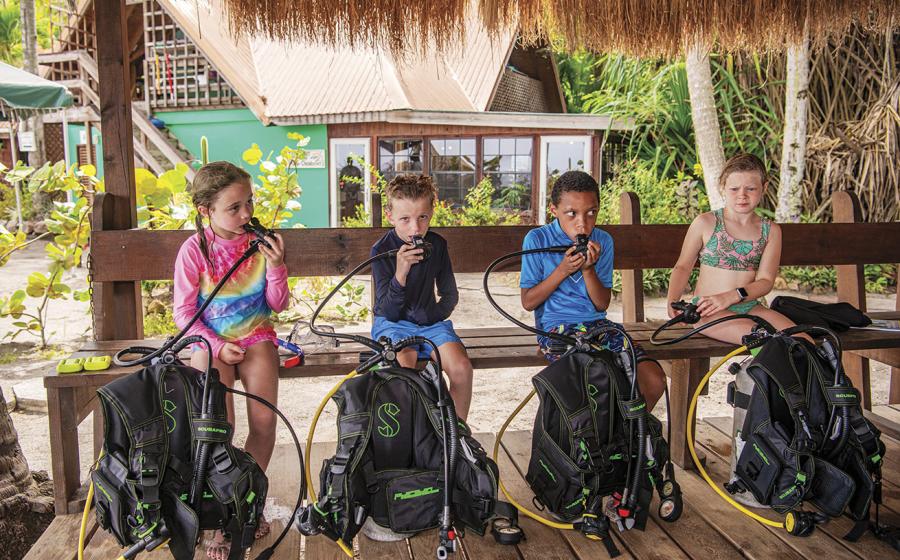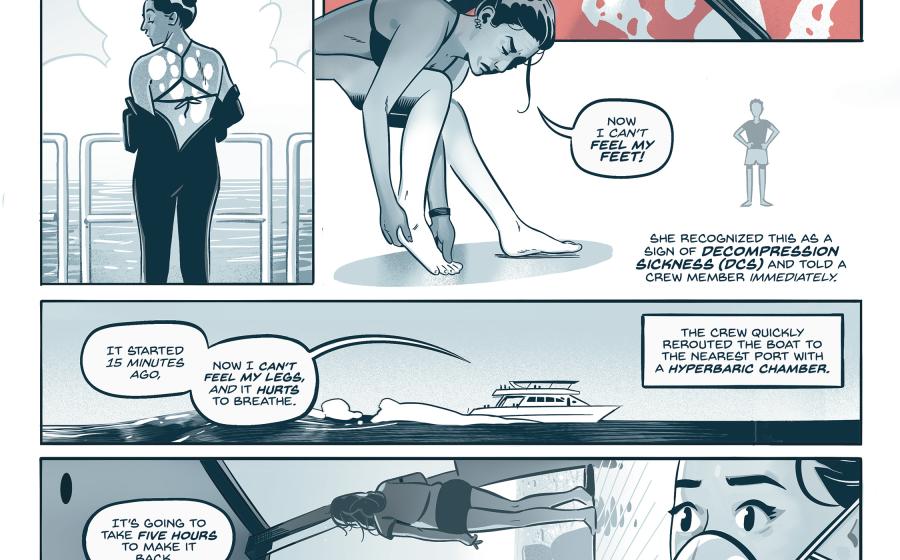Asthma, Skin Cancer and Diving
August 2001
By Ernest Campbell and Arlene Perlmutter
Will Asthma Prevent Me from Becoming a Divemaster?
I am going to enroll in a divemaster course, but I have asthma. Could this be a problem?
via e-mail
You shouldn't have any problems tackling divemaster-level training if you have reached the rescue level without asthma problems. However, there may be restrictions imposed by your certifying agency. Historically, asthma has been an absolute contraindication to diving. Diving physicians have felt that the risk for developing arterial gas embolisms is high and that asthmatics should not be permitted to dive.
However, the Undersea and Hyperbaric Medical Society decided that asthma should no longer be considered an absolute contraindication to diving. Rather, divers must be made aware of the risk factors. The following recommendations were made:
-
Exercise- or cold-induced asthmatics should not dive.
-
Asthmatics requiring chronic medications (a bronchodilator within 48 hours of the dive) should not dive.
-
Mild to moderate asthmatics with normal screening spirometry can be considered candidates for diving.
-
If an asthmatic has an attack, screening spirometry should be done, and the individual should not dive until his airway function returns to normal.
On the other hand, as in your case, many asthmatics can dive safely. It would seem that some of the old safety concerns have been overstated, and if your physician feels that you can dive, you will probably get along just fine. Based on the latest medical data, the YMCA protocols for asthmatics seem to be the most reasonable (www.ymcascuba.org/ymcascub/asthmatc.html). It isn't wise to dive if you can't meet these standards.
Can I Dive After a Vasectomy?
What is the recommended recovery time before diving after a vasectomy?
via e-mail
A vasectomy is a simple operation that consists of a small scrotal incision and removal of a small section of the vas deferens. Diving can generally be resumed after these operations when the incision or incisions have healed without scabs, or when you are cleared by your surgeon. Diving itself will have no effect on your surgery nor will the operation have any effect on your diving.
What Is the Treatment for Middle Ear Barotrauma?
Is there a specific treatment for middle ear barotrauma to help eliminate the pressure and fluid in the ear? How long does this generally last?
via e-mail
Barotrauma of the middle ear occurs from swelling and bleeding after the ear is damaged from a diver's inability to equalize pressures on descent or ascent. Treatment involves reducing the swelling, draining the serum and blood through the eustachian tubes, and treating any infection that occurs when the eustachian tubes are blocked.
This treatment generally consists of oral decongestants and antibiotics. Antibiotics are used only when there is fluid in the middle ear and there is the possibility of infection. If perforation is present, oral antibiotics should be used. Ear drops are not advised if there is perforation of the eardrum.
Middle ear barotrauma usually clears up anywhere from several days to six weeks, depending upon the degree of damage done and whether or not there is a perforation of the eardrum.
Divers with middle ear barotrauma should not dive until all symptoms have cleared. If there has been perforation, do not dive for at least six weeks after the perforation has healed. No ear drops should be used in the event of rupture, as damage can be done to the middle ear.
How Will Exercise Affect My Diving Experience?
I am an extremely fit 62-year-old who regularly works out at my local gym. I am planning a trip to Grand Bahama Island and would like to continue my regular gym routines coupled with extensive scuba and skin diving. How much is too much? I have 40 years of diving experience, but this is the first time I will have the chance to experience virtually unlimited diving in warm water. What would you suggest?
via e-mail
First, congratulations on keeping yourself fit. This is something that you can continue to do on your dive trips, with certain precautions. The results of some studies suggest that the risk of neurologic decompression illness is reduced by physical conditioning, and the effect is independent of differences in age and weight.
You definitely should not exercise in the time period immediately after a dive while off-gassing or within several hours after a series of dives. Also, scotch any plan for mountain climbing immediately after diving.
If you exercise and plan to dive following the exercise, it would be wise to allow for a cool-down and rehydration period.
Skin Safety Tips
By Arlene Perlmutter
As a diver, you can't avoid the sun completely. However, you can take certain precautions to limit your exposure.
-
Use sunscreen with an SPF of 15 or higher. Apply 15 to 30 minutes before going outdoors and reapply every two hours and after swimming or sweating.
-
Avoid tanning beds or sunlamps. These devices give off ultraviolet light.
-
Wear sunglasses that wrap around your face and block UV rays.
-
Seek out shade.
-
Wear protective clothing, such as a wide-brim hat.
-
Limit sun exposure during peak sunlight hours (10 a.m. to 4 p.m.).
-
Check your skin regularly.
Learn Your ABCD's for Early Detection of Melanoma
By Arlene Perlmutter
There are two general types of skin cancers: nonmelanoma and melanoma. Nonmelanoma skin cancers include basal cell carcinoma and squamous cell carcinoma. Melanoma is a more serious type of skin cancer and accounts for the majority (80 percent) of deaths from skin cancer.
Knowing the differences between normal moles and melanoma can help you detect skin cancer early. Changes in a mole could indicate signs of skin cancer. Perform a self-examination once a month by standing in a brightly lit room with a full-length mirror and hand-held mirror. Examine all areas of your body, including your front and back, sides, forearms, upper arms, palms, legs, feet, face, neck, scalp and buttocks for growths, birthmarks, moles and skin discolorations.
Remember your ABCD's. Examine moles on your skin for the following characteristics:
Asymmetry: One-half of the mole or birthmark doesn't match the other half.
Border irregularity: The edges are ragged, notched or blurred.
Color: The color is not the same all over. It may have different shades of brown or black, with patches of red, white or blue.
Diameter: The area is larger than six millimeters (about the size of a pencil eraser) or is growing larger.
Any mole that changes in size, shape or color should be examined by a doctor immediately.
Fast Facts about SPF
By Arlene Perlmutter
-
SPF stands for Sun Protection Factor. Sunscreens are rated by the strength of their SPF.
-
SPF ratings indicate how well the sunscreen blocks the sun's UVB rays.
-
SPF 30 does not have twice the sun protection of SPF 15. SPF 30 offers 97 percent sun absorption, while SPF 15 offers 95 percent absorption. Research is ongoing to determine the most appropriate choice of sunscreen for different skin types.
-
Regardless of skin type, everyone should use sunscreen.
-
Use sunscreen even on cloudy days. The sun's rays can pass through the clouds.
August 2001
By Ernest Campbell and Arlene Perlmutter
Will Asthma Prevent Me from Becoming a Divemaster?
I am going to enroll in a divemaster course, but I have asthma. Could this be a problem?
via e-mail
You shouldn't have any problems tackling divemaster-level training if you have reached the rescue level without asthma problems. However, there may be restrictions imposed by your certifying agency. Historically, asthma has been an absolute contraindication to diving. Diving physicians have felt that the risk for developing arterial gas embolisms is high and that asthmatics should not be permitted to dive.
However, the Undersea and Hyperbaric Medical Society decided that asthma should no longer be considered an absolute contraindication to diving. Rather, divers must be made aware of the risk factors. The following recommendations were made:
Exercise- or cold-induced asthmatics should not dive.
Asthmatics requiring chronic medications (a bronchodilator within 48 hours of the dive) should not dive.
Mild to moderate asthmatics with normal screening spirometry can be considered candidates for diving.
If an asthmatic has an attack, screening spirometry should be done, and the individual should not dive until his airway function returns to normal.
On the other hand, as in your case, many asthmatics can dive safely. It would seem that some of the old safety concerns have been overstated, and if your physician feels that you can dive, you will probably get along just fine. Based on the latest medical data, the YMCA protocols for asthmatics seem to be the most reasonable (www.ymcascuba.org/ymcascub/asthmatc.html). It isn't wise to dive if you can't meet these standards.
Can I Dive After a Vasectomy?
What is the recommended recovery time before diving after a vasectomy?
via e-mail
A vasectomy is a simple operation that consists of a small scrotal incision and removal of a small section of the vas deferens. Diving can generally be resumed after these operations when the incision or incisions have healed without scabs, or when you are cleared by your surgeon. Diving itself will have no effect on your surgery nor will the operation have any effect on your diving.
What Is the Treatment for Middle Ear Barotrauma?
Is there a specific treatment for middle ear barotrauma to help eliminate the pressure and fluid in the ear? How long does this generally last?
via e-mail
Barotrauma of the middle ear occurs from swelling and bleeding after the ear is damaged from a diver's inability to equalize pressures on descent or ascent. Treatment involves reducing the swelling, draining the serum and blood through the eustachian tubes, and treating any infection that occurs when the eustachian tubes are blocked.
This treatment generally consists of oral decongestants and antibiotics. Antibiotics are used only when there is fluid in the middle ear and there is the possibility of infection. If perforation is present, oral antibiotics should be used. Ear drops are not advised if there is perforation of the eardrum.
Middle ear barotrauma usually clears up anywhere from several days to six weeks, depending upon the degree of damage done and whether or not there is a perforation of the eardrum.
Divers with middle ear barotrauma should not dive until all symptoms have cleared. If there has been perforation, do not dive for at least six weeks after the perforation has healed. No ear drops should be used in the event of rupture, as damage can be done to the middle ear.
How Will Exercise Affect My Diving Experience?
I am an extremely fit 62-year-old who regularly works out at my local gym. I am planning a trip to Grand Bahama Island and would like to continue my regular gym routines coupled with extensive scuba and skin diving. How much is too much? I have 40 years of diving experience, but this is the first time I will have the chance to experience virtually unlimited diving in warm water. What would you suggest?
via e-mail
First, congratulations on keeping yourself fit. This is something that you can continue to do on your dive trips, with certain precautions. The results of some studies suggest that the risk of neurologic decompression illness is reduced by physical conditioning, and the effect is independent of differences in age and weight.
You definitely should not exercise in the time period immediately after a dive while off-gassing or within several hours after a series of dives. Also, scotch any plan for mountain climbing immediately after diving.
If you exercise and plan to dive following the exercise, it would be wise to allow for a cool-down and rehydration period.
Skin Safety Tips
By Arlene Perlmutter
As a diver, you can't avoid the sun completely. However, you can take certain precautions to limit your exposure.
Use sunscreen with an SPF of 15 or higher. Apply 15 to 30 minutes before going outdoors and reapply every two hours and after swimming or sweating.
Avoid tanning beds or sunlamps. These devices give off ultraviolet light.
Wear sunglasses that wrap around your face and block UV rays.
Seek out shade.
Wear protective clothing, such as a wide-brim hat.
Limit sun exposure during peak sunlight hours (10 a.m. to 4 p.m.).
Check your skin regularly.
Learn Your ABCD's for Early Detection of Melanoma
By Arlene Perlmutter
There are two general types of skin cancers: nonmelanoma and melanoma. Nonmelanoma skin cancers include basal cell carcinoma and squamous cell carcinoma. Melanoma is a more serious type of skin cancer and accounts for the majority (80 percent) of deaths from skin cancer.
Knowing the differences between normal moles and melanoma can help you detect skin cancer early. Changes in a mole could indicate signs of skin cancer. Perform a self-examination once a month by standing in a brightly lit room with a full-length mirror and hand-held mirror. Examine all areas of your body, including your front and back, sides, forearms, upper arms, palms, legs, feet, face, neck, scalp and buttocks for growths, birthmarks, moles and skin discolorations.
Remember your ABCD's. Examine moles on your skin for the following characteristics:
Asymmetry: One-half of the mole or birthmark doesn't match the other half.
Border irregularity: The edges are ragged, notched or blurred.
Color: The color is not the same all over. It may have different shades of brown or black, with patches of red, white or blue.
Diameter: The area is larger than six millimeters (about the size of a pencil eraser) or is growing larger.
Any mole that changes in size, shape or color should be examined by a doctor immediately.
Fast Facts about SPF
By Arlene Perlmutter
SPF stands for Sun Protection Factor. Sunscreens are rated by the strength of their SPF.
SPF ratings indicate how well the sunscreen blocks the sun's UVB rays.
SPF 30 does not have twice the sun protection of SPF 15. SPF 30 offers 97 percent sun absorption, while SPF 15 offers 95 percent absorption. Research is ongoing to determine the most appropriate choice of sunscreen for different skin types.
Regardless of skin type, everyone should use sunscreen.
Use sunscreen even on cloudy days. The sun's rays can pass through the clouds.






